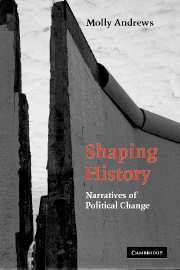Book contents
6 - South Africa: told and untold stories
Published online by Cambridge University Press: 15 December 2009
Summary
Much has been written about personal narratives and the importance of storytelling in post-apartheid South Africa. Njabulo Ndebele (1998) comments that one of the major effects of the Truth and Reconciliation Commission (TRC) was ‘the restoration of narrative. In few countries in the contemporary world do we have a living example of people reinventing themselves through narrative’ (1998: 27). What is special about South Africa is not the re-invention of self through narrative, but rather that this has been carried out by the state, in a very conscious effort to remould national identity. (While states customarily recreate and maintain national identity through the recital of particular stories, which is ultimately read as history, rarely does this occur as an explicit project intended to engage the whole nation.) The first decade of ‘the new South Africa’ has been characterised by an extraordinary effort to remake national identity through gathering and weaving together individual stories. In South Africa, one can observe collective memory in the making.
For this reason, among others, it is perhaps not surprising that South Africa has ignited international passions in a way that few nations in recent history have managed. Its history of the twentieth century is a quintessential tale for our time, with images – ranging from the shootings in Soweto to Mandela's release from prison – which are indelibly marked on the conscience of the world.
- Type
- Chapter
- Information
- Shaping HistoryNarratives of Political Change, pp. 148 - 176Publisher: Cambridge University PressPrint publication year: 2007



